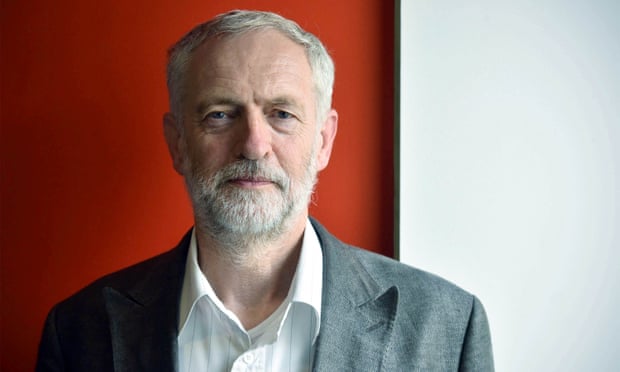
The accusation is widely made that Jeremy Corbyn and his supporters have moved to the extreme left on economic policy. But this is not supported by the candidate’s statements or policies
His opposition to austerity is actually mainstream economics, even backed by the conservative IMF. He aims to boost growth and prosperity. He voted against the shameful £12bn in cuts in the welfare bill.
Despite the barrage of media coverage to the contrary, it is the current government’s policy and its objectives which are extreme. The attempt to produce a balanced public sector budget primarily through cuts to spending failed in the previous parliament. Increasing child poverty and cutting support for the most vulnerable is unjustifiable. Cutting government investment in the name of prudence is wrong because it prevents growth, innovation and productivity increases, which are all much needed by our economy, and so over time increases the debt due to lower tax receipts.
We the undersigned are not all supporters of Jeremy Corbyn. But we hope to clarify just where the “extremism” lies in the current economic debate.
Yours,
David BlanchflowerBruce V Rauner professor of economics, Dartmouth and Stirling, ex-member of the MPC
Mariana MazzucatoProfessor, Sussex
Grazia Ietto-GilliesEmeritus professor, London South Bank University
Malcolm WalkerEmeritus professor, Leeds
Robert WadeProfessor, LSE
Michael BurkeEconomist
Steve KeenProfessor, Kingston University London
Victoria ChickEmeritus professor, UCL
Anna CooteNEF personal capacity
Ozlem OnaranProfessor, Greenwich
Andrew CumbersProfessor, Glasgow
Tina RobertsEconomist
Dr Suzanne J KonzelmannBirkbeck
Tanweer AliLecturer, New York
John WeeksProfessor, SOAS
Marco Veronese PassarellaLecturer, University of Leeds
Dr Judith HeyerEmeritus Fellow, Somerville College, Oxford
Dr Jerome De-HenauSenior lecturer, Open University
Stefano LucarelliProfessor, University of Bergamo
Paul HudsonFormerly Universität Wissemburg-Halle
Mario SeccarecciaProfessor, Ottawa
Dr Pritam SinghProfessor, Oxford Brookes
Arturo HermannSenior research fellow at Istat, Rome
Dr John RobertsBrunel
Cyrus BinaProfessor, Minnesota
Alan FreemanRetired former economist
George IrvinProfessor, SOAS
Susan PashkoffEconomist
Radhika DesaiProfessor, University of Manitoba
Diego Sánchez-AncocheaAssociate professor, University of Oxford
Guglielmo Forges DavanzatiAssociate professor, University of Salento
Jeanette FindlaySenior lecturer, Glasgow
Raphael KaplinskyEmeritus professor, Open University
John RossSocialist Economic Bulletin
Steven HailAdjunct lecturer, University of Adelaide
Louis-Philippe RochonAssociate professor, Laurentian
Hilary WainwrightEditor, Red Pepper
Arturo HermannSenior researcher, ISAE, Rome
Joshua Ryan-CollinsNEF personal capacity
James MedwayLecturer, City University
Alberto PaloniProfessor, Glasgow
Dr Mary RobertonLeeds
His opposition to austerity is actually mainstream economics, even backed by the conservative IMF. He aims to boost growth and prosperity. He voted against the shameful £12bn in cuts in the welfare bill.
Despite the barrage of media coverage to the contrary, it is the current government’s policy and its objectives which are extreme. The attempt to produce a balanced public sector budget primarily through cuts to spending failed in the previous parliament. Increasing child poverty and cutting support for the most vulnerable is unjustifiable. Cutting government investment in the name of prudence is wrong because it prevents growth, innovation and productivity increases, which are all much needed by our economy, and so over time increases the debt due to lower tax receipts.
We the undersigned are not all supporters of Jeremy Corbyn. But we hope to clarify just where the “extremism” lies in the current economic debate.
Yours,
David BlanchflowerBruce V Rauner professor of economics, Dartmouth and Stirling, ex-member of the MPC
Mariana MazzucatoProfessor, Sussex
Grazia Ietto-GilliesEmeritus professor, London South Bank University
Malcolm WalkerEmeritus professor, Leeds
Robert WadeProfessor, LSE
Michael BurkeEconomist
Steve KeenProfessor, Kingston University London
Victoria ChickEmeritus professor, UCL
Anna CooteNEF personal capacity
Ozlem OnaranProfessor, Greenwich
Andrew CumbersProfessor, Glasgow
Tina RobertsEconomist
Dr Suzanne J KonzelmannBirkbeck
Tanweer AliLecturer, New York
John WeeksProfessor, SOAS
Marco Veronese PassarellaLecturer, University of Leeds
Dr Judith HeyerEmeritus Fellow, Somerville College, Oxford
Dr Jerome De-HenauSenior lecturer, Open University
Stefano LucarelliProfessor, University of Bergamo
Paul HudsonFormerly Universität Wissemburg-Halle
Mario SeccarecciaProfessor, Ottawa
Dr Pritam SinghProfessor, Oxford Brookes
Arturo HermannSenior research fellow at Istat, Rome
Dr John RobertsBrunel
Cyrus BinaProfessor, Minnesota
Alan FreemanRetired former economist
George IrvinProfessor, SOAS
Susan PashkoffEconomist
Radhika DesaiProfessor, University of Manitoba
Diego Sánchez-AncocheaAssociate professor, University of Oxford
Guglielmo Forges DavanzatiAssociate professor, University of Salento
Jeanette FindlaySenior lecturer, Glasgow
Raphael KaplinskyEmeritus professor, Open University
John RossSocialist Economic Bulletin
Steven HailAdjunct lecturer, University of Adelaide
Louis-Philippe RochonAssociate professor, Laurentian
Hilary WainwrightEditor, Red Pepper
Arturo HermannSenior researcher, ISAE, Rome
Joshua Ryan-CollinsNEF personal capacity
James MedwayLecturer, City University
Alberto PaloniProfessor, Glasgow
Dr Mary RobertonLeeds
No comments:
Post a Comment